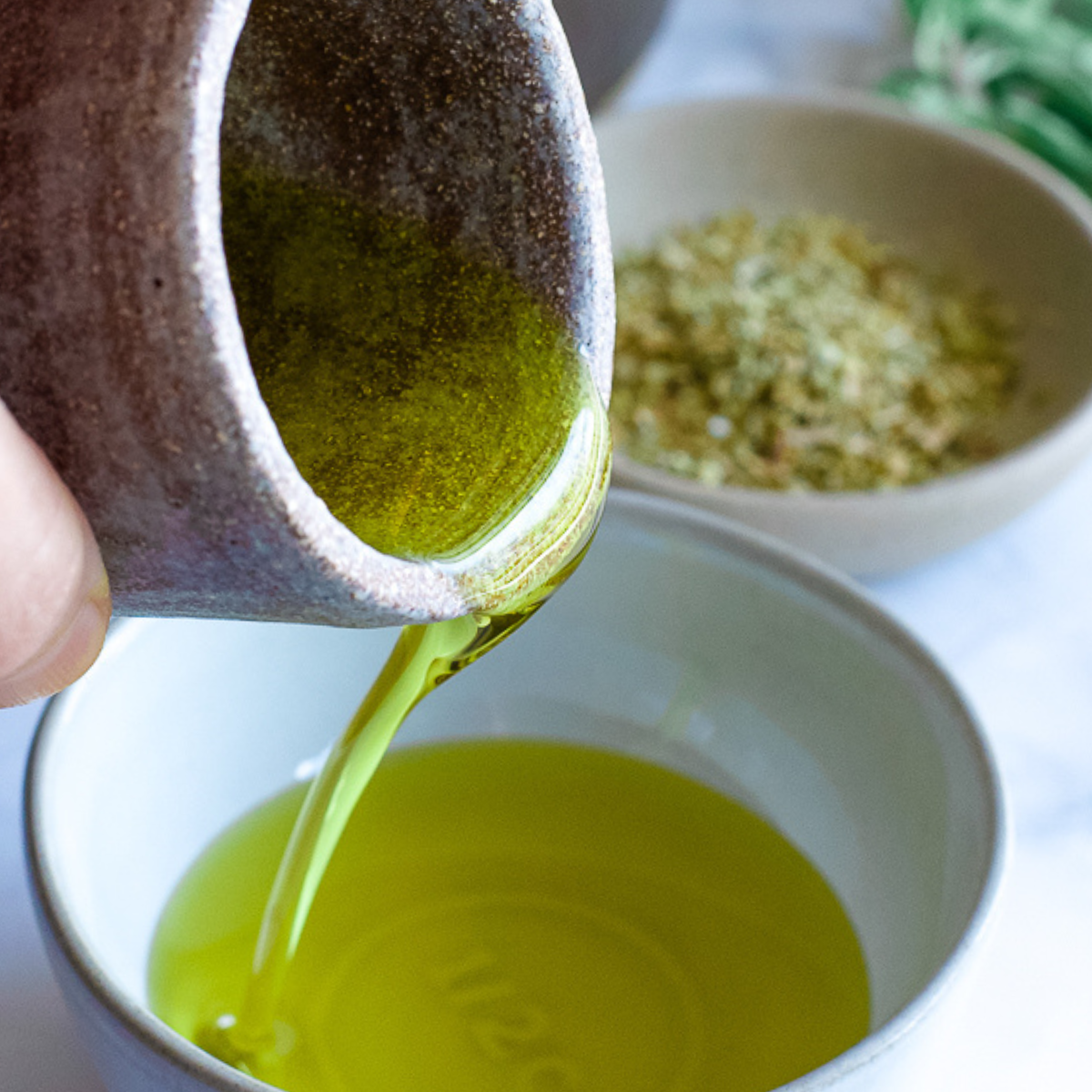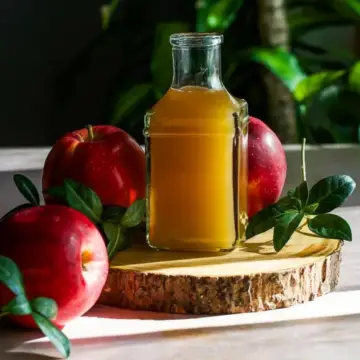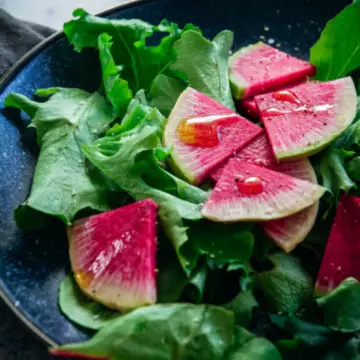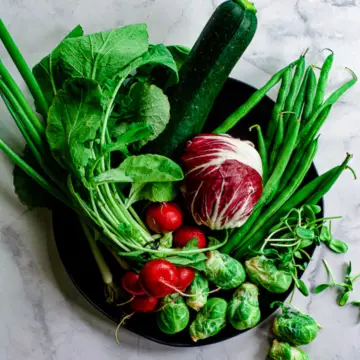Cooking with the right kinds of oils can be a game-changer for your health. In this post, you'll find out the best and worst cooking oils, benefits, smoke points, and more.

Olive oil, oh olive oil. I just can't say enough about one of my favorite foods. I use it every day in salads of every kind, for veggies and in cooking...BUT the more research I've been doing, the more I realize that perhaps olive oil should stay on my salad more so than in my frying pan.
Olive oil is without a doubt one of the healthiest foods. It was considered sacred in ancient times. "Homer, the immortal Greek poet, called olive oil liquid gold and the Greek Laws of Solon, during the 6th to 7th century BC, prohibited the cutting down of olive trees on the punishment of death." The benefits of olive oil are well known and have been well studied.
Benefits of Olive oil:
- anti-inflammatory properties
- it prevents heart-disease
- rich in antioxidants
- contains healthy monounsaturated fats
- rich in omega 3 fatty acids
- it may help to prevent stroke
In addition to being beneficial as a food, olive oil has many uses topically as well:
- can be used as a hair treatment before shampoo
- shaving cream alternative
- use it as a moisturizer
- helps to heel cracked skin on hands and feet
- makeup remover
- use it as eye cream
So now that we covered some of the benefits, I wanted to focus on why olive oil is not as beneficial in cooking. Olive oil contains monounsaturated fats, which are extremely healthy and beneficial but are not heat stable as they have one double bond that can react with oxygen. Most other vegetable oils contain polyunsaturated fats with many double bonds and many opportunities to react with oxygen. While it is certainly better than cooking with vegetable oils, olive oil still has the chance of reacting with oxygen and becoming unstable. Additionally, the heart healthy phenols are compromised once the oil is heated and as with polyunsaturated fats, heating the oil past its smoke point, produces toxic fumes and free radicals.
For a brief description of fatty acids, please see below:
"FATTY ACIDS
Please note that we are dealing here with fatty acids forming part of the triacylglycerol molecule. We will address the free fatty acids in the next section. The fatty acid composition of olive oil varies widely depending on the cultivar, maturity of the fruit, altitude, climate, and several other factors.
- A fatty acid has the general formula: CH3(CH2)nCOOH where n is typically an even number between 12 and 22.
- If no double bonds are present the molecule is called a saturated fatty acid.
- If a chain contains double bonds, it is called an unsaturated fatty acid.
- A single double bond makes a monounsaturated fatty acid.
- More than one double bond makes a polyunsaturated fatty acid."
The problem with vegetable oils:
Prior to the 1900s, vegetable oil was practically non-existent. With the advent of the industrial revolution, the need for creating cheap substitutes drove the need for alternatives to be created. Vegetable oils such as canola, corn, sunflower, safflower, soybean, rice bran and cotton seed oil are not easily extracted the way coconut, avocado and olive oil are. Vegetable oils go through rigorous processing and extreme heat in order to become shelf stable and ingestible. But just because they are ingestible does not make them safe for long term consumption by humans. These oils oxidize and become rancid once they've been exposed to such heat and have been stripped of nutrients.
Vegetable oils are the oils found in most commercially processed food items that are shelf stable (with very few exceptions). Everything from cookies, to chips, crackers, bread, salad dressing contains some sort of vegetable oil. Many of today's modern diseases are traced to the increased consumption of processed foods. Autoimmune disease, heart disease, allergies, diabetes and cancer had very low occurrence prior to the Industrial Revolution.
For thousands of years, humans have used animal fat to cook with but coincidentally with the introduction of these vegetable oils, animal fats were deemed "bad" for our health. To better understand this, let's look at the American Heart Association, which is the driving factor behind the US Dietary Guidelines.
The AHA was an extremely small organization prior to 1940 until Procter and Gamble gave the organization 1.5 million dollars and helped to make it into a national organization. Procter and Gamble was also the creator of Crisco. The AHA made its very first recommendation against saturated fat in 1961 recommending that vegetable oils are a "healthier alternative".
The issue with Glyphosate:
Many of the above-mentioned oils come from genetically modified (GMO) crops and these crops are sprayed with the herbicide Roundup. The active ingredient in Roundup is glyphosate. The important thing to understand about glyphosate once sprayed is that it is present in every part of the plant from root to tip. This is extremely concerning and alarming as humans and animals are inadvertently exposed to this chemical by consuming the processed foods which are made with the oils.
Sri Lanka's president banned glyphosate and Roundup from entering the country citing that numerous rice paddy workers had suffered kidney failure.
In order to avoid certain issues that come from cooking with vegetable oils and consuming them in packaged foods, the best alternative is to start eating real food and cooking with traditional fats that not only make food taste fantastic but are actually good for us.
Consider these alternatives:
The best to consider are fats that are solid at room temperature. Reason being, they contain zero double bonds therefore not volatile and do not react with oxygen. The risk of oxidation is therefore eliminated.
- Ghee - smoke point (450-485°F) and has a number of health benefits
- Coconut oil - smoke point (refined 450°F and unrefined 350°F) - contains MCA medium chain fatty acids, which are easily converted by the body into energy, much easier on the digestive system, not stored as fat easily
- Duck fat - smoke point (350°F) - contains 75% monounsaturated fat and 25% saturated fat
- Lard - smoke point (370°F) 50% monounsaturated fat and 50% saturated fat. High in Omega 3s (the good kind) and low in Omega 6s (the not so good kind)
- Butter - smoke point (350°F) For a very enlightening article on butter, please click here
- Tallow - smoke point (350 -450°F) is high in CLA (Conjugated Linoleic Acid) a type of fat that is has shown promising anti-cancer properties
What about Avocado oil?
Avocado oil is one of the best sources for cooking if you prefer cooking with oil. It has a high smoke point (400-500°F). And while it is still a monounsaturated fat containing one double bond, the risk of oxidation is far lower due to its high smoke point. Aside from that, avocado is one of the world's healthiest foods with numerous health benefits.
Avocado oil benefits:
- contains monounsaturated fat with 70% oleic acid
- increases the absorption of other nutrients as fat is vital for this process
- helps fight free radicals
- has been shown to reduce heart disease
- improves skin health
- may reduce arthritis symptoms by reducing inflammation
- it improves hair growth
When it comes to choosing the best source for cooking for you and your family, do your research, know what you put into your body and your children's bodies. Health is everything.





Comments
No Comments